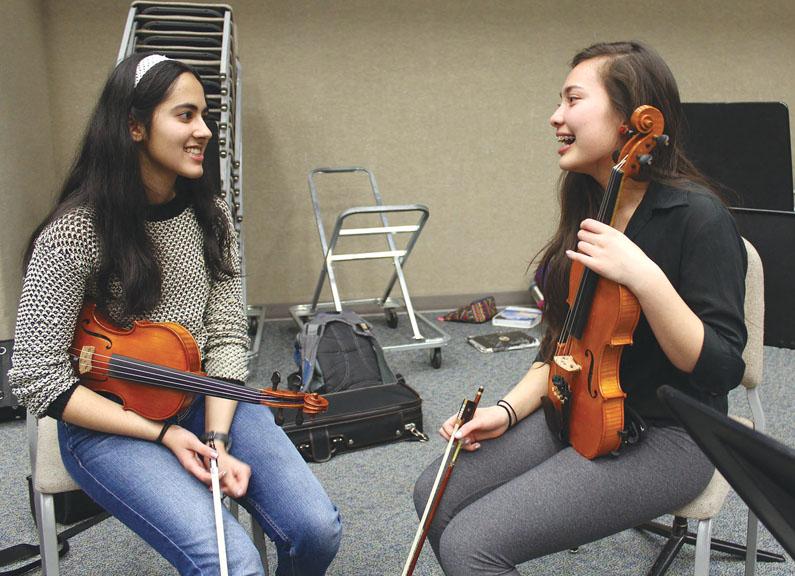At the beginning of the second semester, sophomore Danielle “Dani” Newhouse moved to CHS from Japan. This wasn’t Newhouse’s first time moving. However, at every new school, there is one constant: Newhouse must find new friends.
“When I first moved to CHS, I felt a little lonely. When I first go to class, everyone already knows one another. It’s like no one seems to want to talk to you, since you’re just another face in the crowd,” she said.
Many other high school students like Newhouse are part of a growing loneliness epidemic. According to a March 2015 Birmingham Young University study, loneliness should be on people’s radars as a major public health issue, with a 15 percent increase in teenagers who identified as lonely since 2000. The study compares loneliness to the likes of obesity and drug abuse in terms of its effect on health.
A University of Chicago study conducted in January 2009 found that adults who identified as being lonely were more likely than non-lonely adults to participate in self-harm and have weakened immune systems, sleeping disorders and high stress levels.
While Newhouse didn’t experience illness or have trouble sleeping because of loneliness, she said she did feel stressed.
“Not knowing anyone made me really stressed. I felt that in a lot of my classes, everyone already had their own established friend groups,” she said. “I definitely felt a lot more self-conscious. I was really paying attention to how people might look at me or what they might think of me.”
According to CHS social worker Jane Wildman, there is a strong correlation between loneliness, depression and anxiety.
“Loneliness is pretty prevalent among the students I see. (Anxiety) and loneliness are two of the bigger things that accompany loneliness. Sometimes, it gets to the point where people become suicidal,” Wildman said.
According to a December 2013 report by the American Association of Critical –Care Nurses, there are two types of loneliness. In one type, a person may have lots of social interaction but still feels lonely since he doesn’t have meaningful relationships with others. In the second, people don’t actually have social interactions.
Newhouse said she experienced both kinds of loneliness when she moved to CHS.
“Halfway through the year, the other students didn’t really know I was new, since there are so many people at this school,” she said. “I’m kind of a shy person, so I didn’t really say ‘hi’ to all these people. It was pretty hard to meet people and talk to them.”
Newhouse said she felt she experienced more perceived loneliness, where there was a discrepancy between the levels of social interaction she wanted to have and the social interaction she did have.
Newhouse said, “I was lucky, because I had a friend in Japan who moved from Carmel. One of her friends showed me around the school and introduced me to her friends. At first, I felt like I didn’t really have a strong friendship connection with them. I felt that people just were with me because they had to be, since I didn’t really know anyone else.”
Wildman said that both types of loneliness are harmful. She attributes a decline in social interaction and an increase in loneliness partly to the use of technology. Despite all the contacts people can make through social media, they lose the chance for face-to-face interactions.
CHS has its own methods of combating loneliness in new students: Greyhound Connection. According to Quincy Smith, Greyhound Connection co-president and junior, club members help new students socialize and acclimate to CHS.
“Loneliness can be really hard on a new student. It can affect them in their classes because in a lot of classes, you have a lot of partner work. If they don’t know anyone and they don’t feel comfortable, it’ll be hard for them to find partners,” Smith said. “I’ve never been a new student, but I think that everyone’s had that feeling before, feeling out of place. I can understand people’s loneliness, and I try to help them.”
To overcome her loneliness, Newhouse said she opened up to her peers.
“I’ve definitely become more sociable. I’m more confident with the people I meet, and I’m able to create strong friendships and relationships. Now, when I see someone, they’re like, ‘Over here, come hang out with us!’ I spend time with my friends in the morning now. I’m sure my loneliness has improved,” she said.

































![AI in films like "The Brutalist" is convenient, but shouldn’t take priority [opinion]](https://hilite.org/wp-content/uploads/2025/02/catherine-cover-1200x471.jpg)









































![Review: “The Immortal Soul Salvage Yard:” A criminally underrated poetry collection [MUSE]](https://hilite.org/wp-content/uploads/2025/03/71cju6TvqmL._AC_UF10001000_QL80_.jpg)
![Review: "Dog Man" is Unapologetically Chaotic [MUSE]](https://hilite.org/wp-content/uploads/2025/03/dogman-1200x700.jpg)
![Review: "Ne Zha 2": The WeChat family reunion I didn’t know I needed [MUSE]](https://hilite.org/wp-content/uploads/2025/03/unnamed-4.png)
![Review in Print: Maripaz Villar brings a delightfully unique style to the world of WEBTOON [MUSE]](https://hilite.org/wp-content/uploads/2023/12/maripazcover-1200x960.jpg)
![Review: “The Sword of Kaigen” is a masterpiece [MUSE]](https://hilite.org/wp-content/uploads/2023/11/Screenshot-2023-11-26-201051.png)
![Review: Gateron Oil Kings, great linear switches, okay price [MUSE]](https://hilite.org/wp-content/uploads/2023/11/Screenshot-2023-11-26-200553.png)
![Review: “A Haunting in Venice” is a significant improvement from other Agatha Christie adaptations [MUSE]](https://hilite.org/wp-content/uploads/2023/11/e7ee2938a6d422669771bce6d8088521.jpg)
![Review: A Thanksgiving story from elementary school, still just as interesting [MUSE]](https://hilite.org/wp-content/uploads/2023/11/Screenshot-2023-11-26-195514-987x1200.png)
![Review: "When I Fly Towards You", cute, uplifting youth drama [MUSE]](https://hilite.org/wp-content/uploads/2023/09/When-I-Fly-Towards-You-Chinese-drama.png)
![Postcards from Muse: Hawaii Travel Diary [MUSE]](https://hilite.org/wp-content/uploads/2023/09/My-project-1-1200x1200.jpg)
![Review: "Ladybug & Cat Noir: The Movie," departure from original show [MUSE]](https://hilite.org/wp-content/uploads/2023/09/Ladybug__Cat_Noir_-_The_Movie_poster.jpg)
![Review in Print: "Hidden Love" is the cute, uplifting drama everyone needs [MUSE]](https://hilite.org/wp-content/uploads/2023/09/hiddenlovecover-e1693597208225-1030x1200.png)
![Review in Print: "Heartstopper" is the heartwarming queer romance we all need [MUSE]](https://hilite.org/wp-content/uploads/2023/08/museheartstoppercover-1200x654.png)






